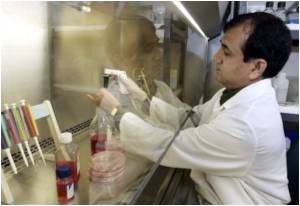In cortical neurons, hypoxia-inducible factor 1 (HIF-1) attenuates amyloid-beta protein neurotoxicity and decreases apoptosis induced by oxidative stress or hypoxia.

Their results confirmed that rAAV-HIF-1α significantly reduces apoptosis induced by amyloid-beta protein in primary cultured hippocampal neurons. This mechanism may be related to HIF-1α-decreased hippocampal neuronal intracellular calcium concentration ([Ca2+]i), thereby inhibiting apoptotic cascade reactions.
With these investigations published in the Neural Regeneration Research (Vol. 9, No. 11, 2014), gene therapy using rAAV to deliver HIF-1α may ultimately provide a new option for clinical treatment of Alzheimer's disease.
Source-Eurekalert










